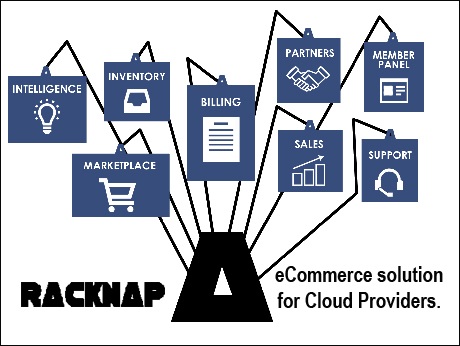
New Delhi, March 19, 2016: Leading Indian cloud and web services provider, ZNet, Technologies, has launched RackNap, a complete cloud service delivery and business automation platform.
This first of its kind completely unified platform, enables the existing cloud providers and also the startups to offer cloud services along with traditional IT services with complete cloud service business cycle automation across several modules - Marketplace and product display, Billing and pricing, Service configuration and delivery, Sales and marketing, Inventory and assets monitoring, CRM and helpdesk management, Multi-tier partner channel enablement, End-customer panel, and Business analytics.
RackNap has been developed as a platform that would solve the problem of cloud and web services providers’ dependency on multiple software for achieving complete automation. And, RackNap is functionally rich enough to support any business that provides products and services on subscription-based pricing models.
RackNap is currently integrated with, and has capability to automate complete product delivery cycle of Microsoft Azure, Openstack, OnApp, Amazon Web Services, IBM - Softlayer, Parallels Cloud Services, LogicBoxes, Office 365, and Google Apps for Work, among others. Along with cloud services, providers can also deliver traditional web services as RackNap also comes integrated with cPanel, goMobi, SmarterMail, WordPress, Joomla, Opencart, Magento, WebsitePanel, etc.
Says Munesh Jadoun, Founder & CEO, RackNap: “At present, there is no tool available that provides complete end-to-end automation and business cycle management, so cloud and IT service providers have to rely on multiple solutions to manage different facets of their business, which mars the end-to-end automation and results in high costs. RackNap, with its diverse modules and functionalities, will serve as a stand-alone, self-sufficient and unified platform for the cloud providers, helping them get rid of the mismanagement and manual processing that stems from dependency across several applications."
RackNap comprises of eight key modules:
Marketplace and product display platform: RackNap’s backend’s integration with a dynamic marketplace helps providers to auto-update pricing, plan configurations and inventory directly from backend with complete automation.
Billing and pricing management: With multiple currencies, taxation levels and payment gateways support, RackNap’s fully compliant billing module enables providers to sell any service on any pricing model.
Support helpdesk and CRM: RackNap’s helpdesk streamlines the call, email and ticket support; and provides support analytics with strong SLA management.
Sales and marketing flow: RackNap provides visibility into complete customer acquisition life cycle – from marketing campaigns and lead generation to successful closure, and automates cross-selling and upselling for existing customers.
Multi-tier partner channel management: Service providers can build a strong partner network by extending RackNap to their partners on 2-tier model, and enable them to sell their services with complete automation.
Inventory management and monitoring: RackNap provides for easy management of hardware and software inventory with visibility into complete infrastructure across multiple datacenters, and efficient allocation of assets based on reporting and forecasting.
RackNap member panel: RackNap’s member panel helps customers manage their relationship with the service providers with a single panel view of all the information – products, billing, support, etc. and provides them with self-serve options.
Business intelligence and analytics: The most distinctive module of RackNap, Business intelligence and analytics module analyses complete organizational data and presents it to decision makers in simplified graphical formats at the click of a button and enables them to make proactive risk analysis, and make smart and timely decisions.
RackNap is priced at $49/user/month. RackNap is also available for free demo with 2 user accounts with complete set of functionalities and all integrations.